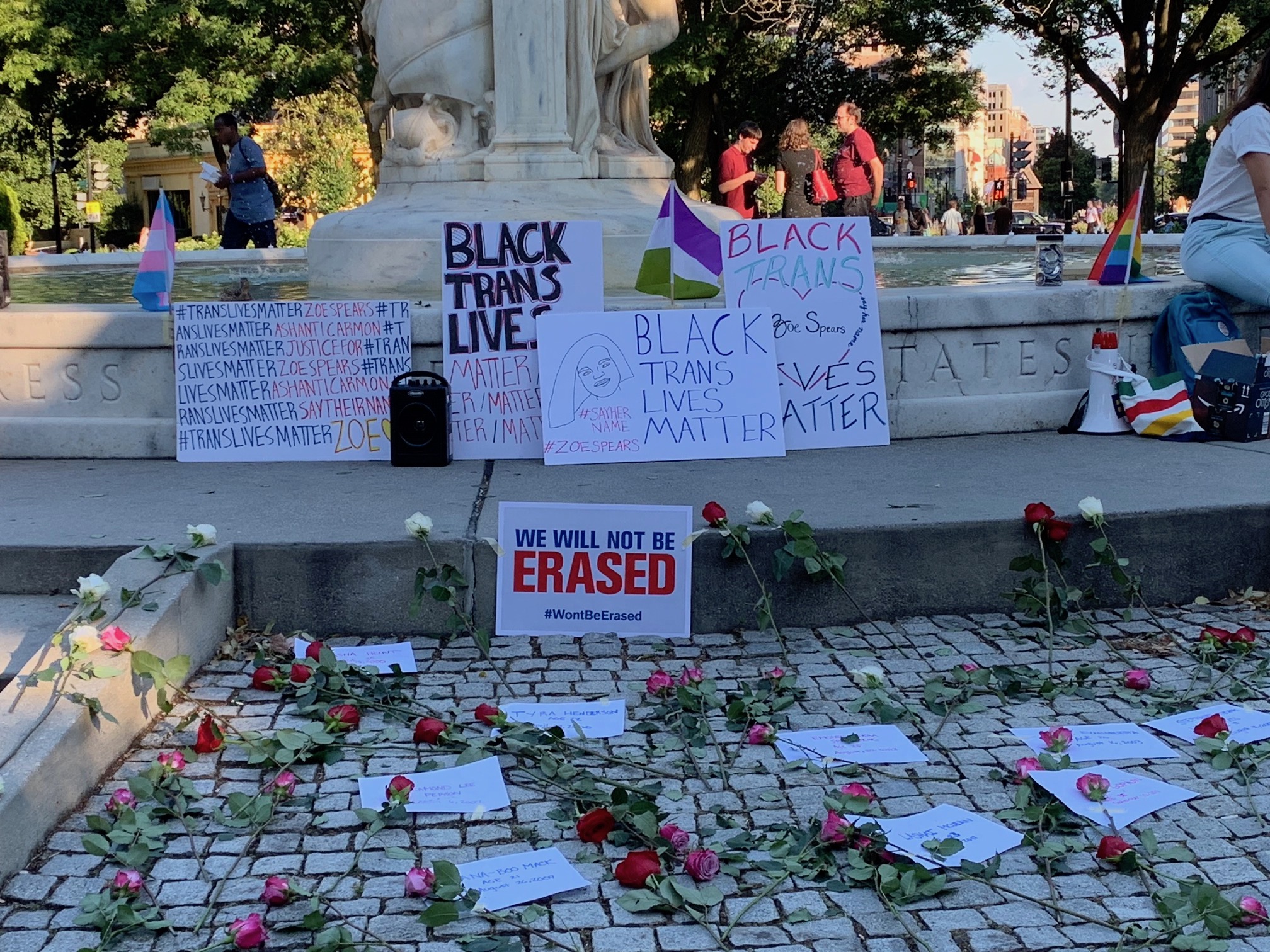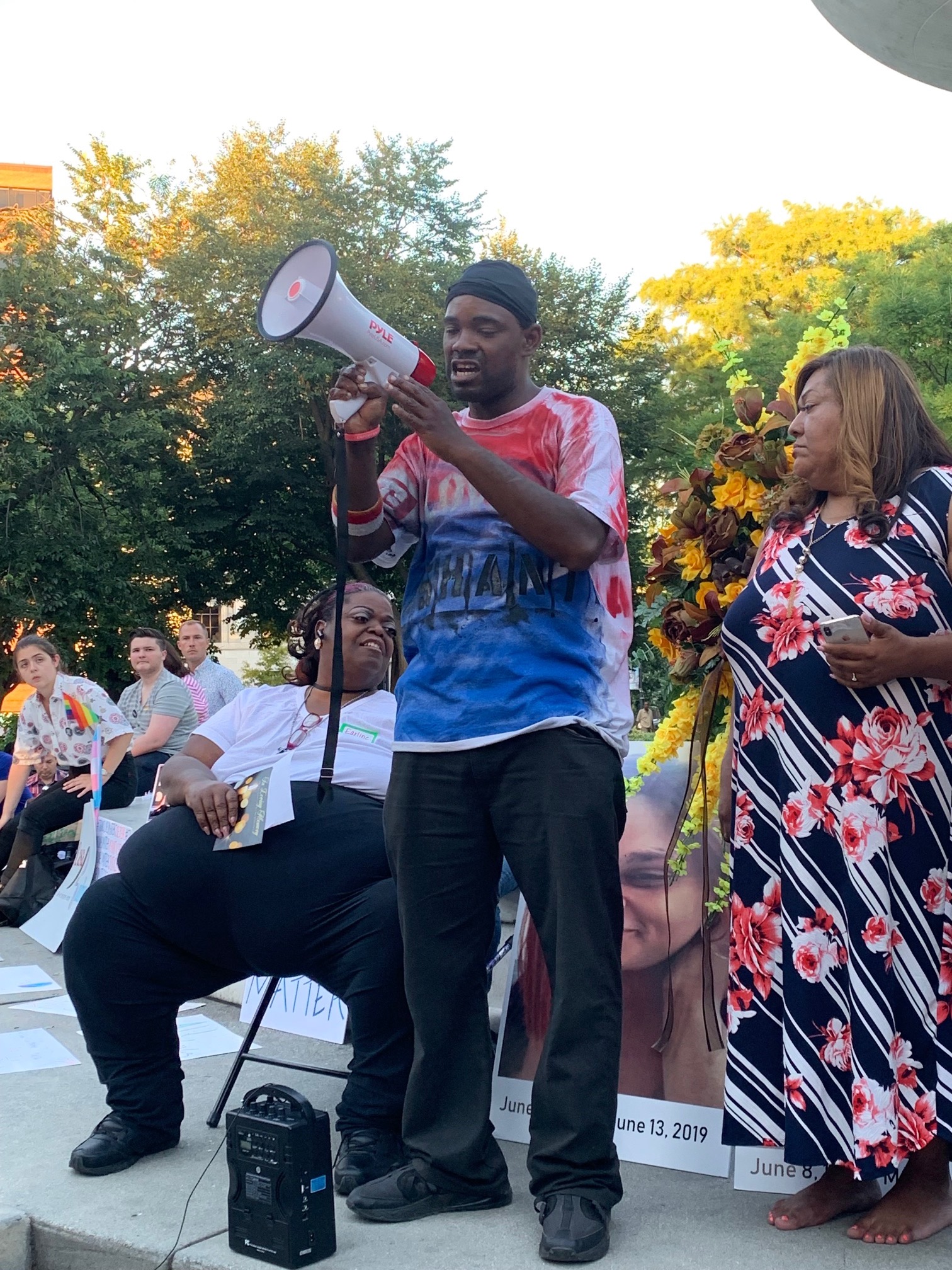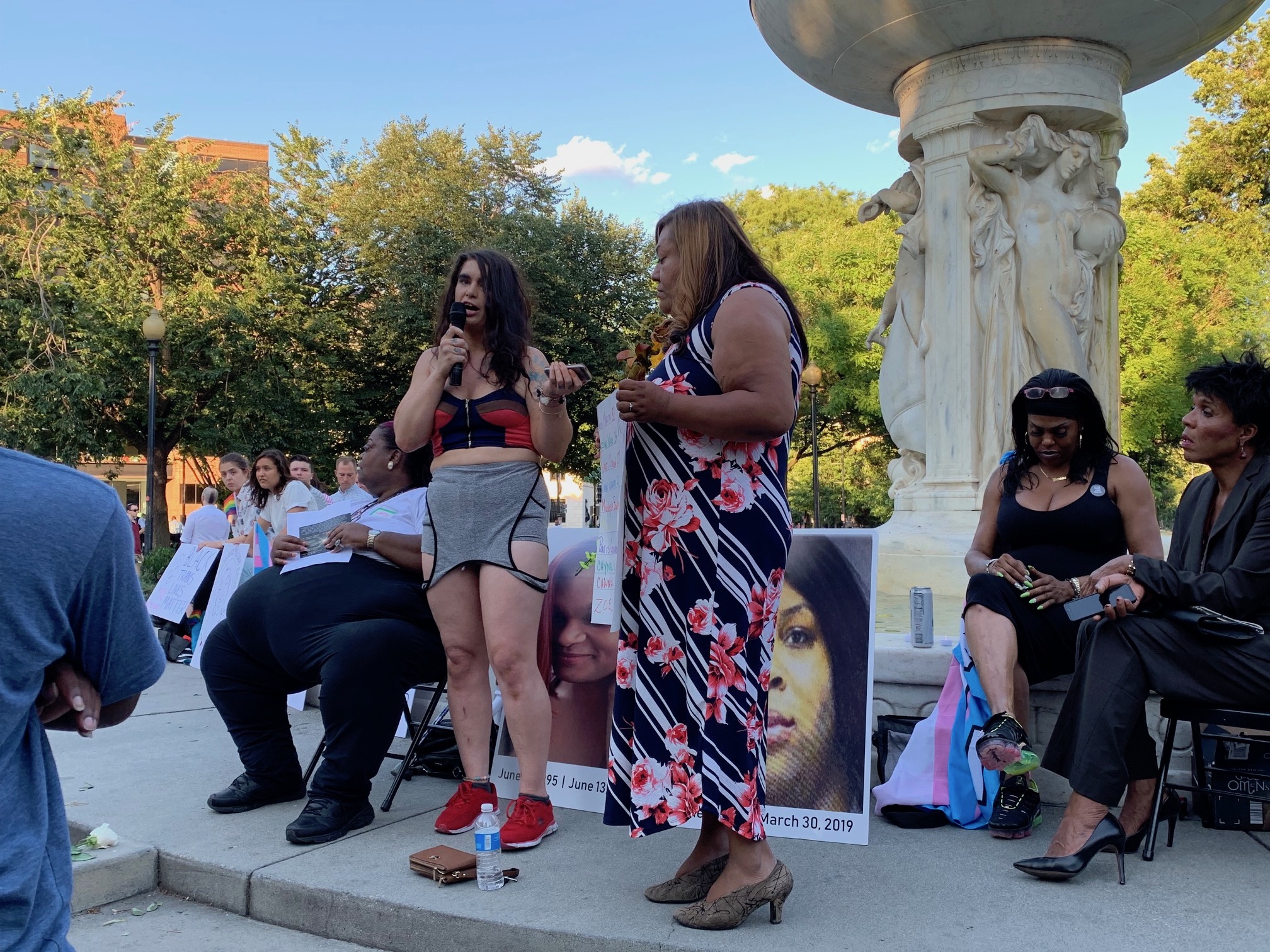WASHINGTON, D.C. — On Friday evening, transgender activists, many from Casa Ruby, a non-profit community center for LGBTQIA people and immigrants, held a vigil to call for an end to violence and harassment against trans women of color in the Washington, D.C., area.
This month, Zoe Spears, a 23-year-old black trans woman, was murdered in a Maryland suburb close to D.C. The murder took place in Fairmont Heights, in an area along Eastern Avenue where another black trans woman in her 20s, Ashanti Carmon, was also killed in March. The area is known as a gathering place for sex workers.
Nationally, Spears was the 10th trans woman to have been murdered in 2019. All of them have been black.

At the vigil on Friday, Charmaine Eccles, a trans woman who knew Ashanti Carmon and Zoe Spears, shared how often she has been attacked.
“I am tired of problems — of just constantly hearing the problems. I’m tired of vigils. And I stand before you today as a survivor. The same place Ashanti and Zoe were murdered, three years ago, I could have met my unfortunate death as well. For years, I prostituted on Eastern Avenue. I have been victimized, I am have been damaged. I have been beaten. I have almost had my throat slit with a hook knife. I have been shot out there. I have been attacked by three men with a shotgun to my face. But still I rise.”
She added, “Ashanti and Zoe don’t deserve this. No trans woman deserves this treatment we go through on a daily basis because of our differences. I’m 6’7″ tall. I walk down the street and some people hate me and I’m a fabulous person. We have to continue to come up with solutions.”
Carmon’s fiance, Phillip Williams, also spoke at the vigil, expressing his worry about trans women going to Eastern Avenue. He added that people should watch out for each other.
Williams said of his family, “They loved her and called her auntie all the time. But that still doesn’t bring good justice to me. Because I see every day couples holding hands and I’m the only one who is walking alone … We’re all we have left, but it’s like I heard earlier — we are human.”

He added, referring to Spears, “And Zoe, I only heard you a few times out of my fiancee’s mouth, but we are going to get those who got y’all.”
The recent deaths are indicative of an ongoing and yearslong problem. Trans women in the D.C. area often experience harassment. Last week, a man allegedly threatened trans women near Casa Ruby. He reportedly sat in his car in the parking lot in front of Casa Ruby and when someone approached him, he allegedly said, “I want my dick sucked, go get me one of those trannies.”
There were three witnesses who spoke to similar incidents with the same man. Casa Ruby CEO Ruby Corado told the Washington Blade of a second incident, “He pulled a gun and said, ‘you will suck my dick.'”
In addition to these incidents, Emmelia Ruiz Talarico, a trans woman who is an activist with the collective No Justice No Pride, said she was harassed at a grocery store after she told a woman at the store not to call her a “bro.” The woman began yelling and two men joined in, she told the Washington Post. The store owner then told the harassers to leave, Ruiz Talarico said, but when she left the store, they came up to her again. She went back to the store and was given a ride home from the store owner.
But 45 minutes after she came back, the harassers arrived at her home. She said the man from the store stood on her front porch and said that she believed the man had a gun. It also appeared as though someone had dented the window of her and her housemates’ home. She said he made a motion as if loading a shotgun. Ruiz Talarico and her housemates went to the basement and called 9-1-1.
There have also been recent incidents of violence against other people in the LGBTQ community and in LGBTQ establishments. On June 16, three people were stabbed in a gay bar in Dupont Circle. On the same day, a gay couple said two to three men yelled homophobic slurs at them. When one of the men asked the harassers what they said, the couple was attacked by 12 men, who allegedly stole a wallet and cell phone from the couple.

Many of the activists and community leaders present at the vigil said that, in order to keep trans women safe, there should be decriminalization of sex work. Many sex workers say criminalization puts them in more dangerous situations, as it forces them to go to isolated areas to avoid police attention. They often feel they can’t report violence without legal consequences. Furthermore, police themselves have forced trans women into sexual activity in exchange for not arresting them on sex work-related charges.
Activists also said housing inequality and employment discrimination needs to be addressed, and that, culturally, cisgender people should advocate against discrimination of trans people.
Gillian Branstetter, spokesperson for the National Center for Transgender Equality, said in a statement to ThinkProgress, “The violence faced by too many Black transgender women around the country—including Zoe and Ashanti right here in DC—is a manifestation of several inequities. A lack of stable housing, income, wealth, support networks, and health care all contribute to a person’s vulnerability to violence. Racism, transmisogyny, police harassment, displacement, and the criminalization of sex work often deny these women equal access to those resources, leaving them exposed to violence.”
Branstetter encouraged lawmakers to fight for nondiscrimination laws, end the criminalization of sex work, improve law enforcement policies, and advance policies to make cities more equitable and affordable.
Dee Curry, a transgender activist, said at the vigil, “I say to you today the onus is on you to make our government responsible and [to make] our mayor not speak to us in tongues and stand up for our rights. We have to say to people here today that every life matters.”
Locally, some LGBTQ organizations have advised for more funding for programs in the DC Office of Human Rights and the Office of LGBTQ Affairs. The Rainbow Caucus of LGBTQ Advisory Neighborhood Commissioners sent a letter to D.C. Council Chairman Phil Mendelson, saying, “There is institutional disrespect and homophobia/transphobia throughout our District government agencies, particularly toward transgender people.”
Ruiz Talarico advocated for other solutions at the vigil, however. She said that funding for certain LGBTQ groups may not help the people who need it most. She also referred to DC police withholding body cam footage from families and advocated for police abolition, rather a greater police response.
“I am here to speak about these attacks but I am not here to pressure the city to give more funding to white cis men in LGBTQ groups who do not recognize there can be no pride for some without liberation for all of us,” Ruiz Talarico said. “No Justice No Pride doesn’t even accept funding from the state. I am here to offer a counter-narrative to those who applaud the police. The girls will not be safe from the police as long as they’re still locking up black children in the city … No more moments of silence when we should be angry, loud, and screaming in the streets. We can’t even have an honest conversation about police violence against trans sex workers because every time we try to start it, everyone cares too much about cop feelings than they do about black and brown lives.”
She also said LGBTQ leaders need to do more about DC’s affordable housing crisis, which leaves the trans community in more vulnerable and dangerous situations. Washington, D.C. is the seventh most expensive city in the United States, according to the real estate listings site Zumper.
